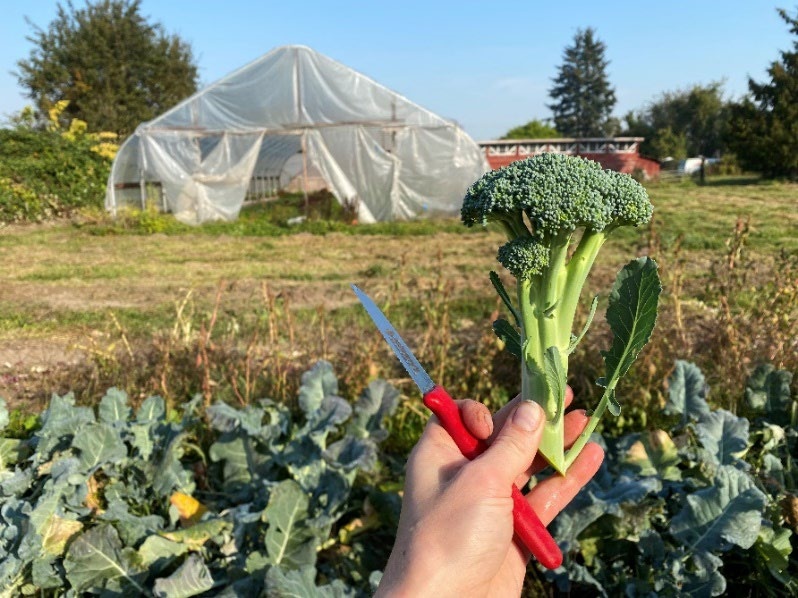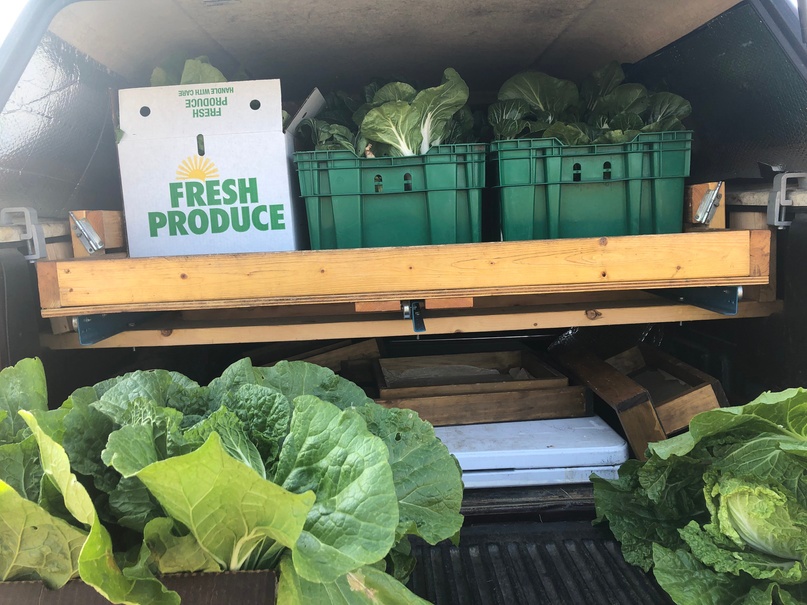BACKGROUND
The purpose of the program was threefold:
- Reduce food waste at the agricultural production, processing, or distribution level through the donation of food.
- Build relationships between HROs and agricultural producers, processors, and/or distributors through the donation of food.
- Provide donated food to individuals in need at TEFAP distribution sites.
FTFB IN WASHINGTON STATE
WSDA used FTFB funds to support the ongoing work of the Farm to Food Pantry (F2FP) program, which has been operated by Harvest Against Hunger since 2014. Washington’s F2FP program has shown that investment in local agriculture through direct-farm purchasing results in strong agricultural relationships and substantial additional donations from farmers. FTFB leveraged those existing relationships and created new ones by supporting the gleaning, processing, and packaging that gleaning organizations need to help divert surplus produce to food pantries and their TEFAP distribution sites.
For the first four years, WSDA FA held a competitive Request for Applications (RFA) process to select HROs to receive this funding. In the fifth and final year, the most recent awardees were allocated funds based on the prior year's performance. Federal funds were at least matched dollar-for-dollar through both in-kind labor as well as with non-federal funds. The value of the donated food was not eligible to be considered as match for federal funds.
Programs like FTFB play a critical role in not only reducing food waste and supporting local farmers, but also in supplying nutritious foods to the continually-growing population of people experiencing food insecurity.
January 21, 2025 marked the end of the program for WSDA FA. As it stands, there is currently no funding for future rounds of FTFB, which would be part of a new Farm Bill.




Vashon Maury Community Food Bank:
"This [FTFB] funding enhanced our ability to harvest food that would otherwise have gone to waste, continue to grow and solidify our community partnerships, and provide nutritious, healthy food to those in need."
Kitsap Conservation District:
"A chef with a soup and sandwich shop in their little corner store also sells house-made ready-to-eat meals, soups, and side dishes from their freezer case. A woman came into the store with a soup container she received from the food bank and asked, “Did you make this???” waving the empty under the chef’s nose. All soups were labelled with project information, the restaurant logo and address (per health district regulations). The chef acknowledged the soup was from their kitchen. The woman clapped her hands together in delight and said, “I need to buy more for my family!! It was so delicious they ate all of it!” She then purchased two more pints of the vegetable soup for her family with her EBT. That moment represented fulfillment of all project goals - nutritious, delicious, local food that nourishes and builds health – physical, economic and social – in our community!"
Harvest Against Hunger:
Partnerships with gleaning supplies:“I absolutely love the ladder we received earlier, I’m pretty sure that I used it on every one of my gleans this season. Perfect size, weight, stability!” -Kitsap Harvest
“With the [FTFB] materials of wax boxes, harvest knives, twist ties, a scale, and many other critical harvest items, our program has managed to increase our efficiency and safety with which we're able to bring community volunteers onto a large wholesale organic farm to harvest designated gleaning crops. This newfound ability to equip volunteers with needed tools, to better track and record quantities gleaned, and to more easily get donations directly to local emergency food resources and distributors has meant a dramatic uptick in how much produce is moving into communities in need in Clallam County.” - WSU Extension, Clallam County
“Having appropriate supplies for harvesting including the orchard ladders, fruit tote bags and knives, makes it easier for volunteers when gleaning. Produce bags help us to package the fresh produce for easier distribution. The wash station helps us bring water to the fields and better provide for volunteers.” - Thurston County Food Bank






Nondiscrimination Statement
In accordance with federal civil rights law and USDA civil rights regulations and policies, the USDA, its agencies, offices, employees, and institutions participating in or administering USDA programs are prohibited from discriminating based on race, color, national origin, religion, sex, disability, age, marital status, family/parental status, income derived from a public assistance program, political beliefs, or reprisal or retaliation for prior civil rights activity, in any program or activity conducted or funded by USDA (not all bases apply to all programs). Remedies and complaint filing deadlines vary by program or incident.Persons with disabilities who require alternative means of communication for program information (e.g., Braille, large print, audiotape, American Sign Language, etc.) should contact the state or local agency that administers the program or contact USDA through the Telecommunications Relay Service at 711 (voice and TTY). Additionally, program information may be made available in languages other than English.
To file a program discrimination complaint, complete the USDA Program Discrimination Complaint Form, AD-3027, found online at How to File a Program Discrimination Complaint and at any USDA office or write a letter addressed to USDA and provide in the letter all of the information requested in the form. To request a copy of the complaint form, call (866) 632-9992. Submit your completed form or letter to USDA by:
- Mail: U.S. Department of Agriculture, Office of the Assistant Secretary for Civil Rights, 1400 Independence Avenue, SW, Mail Stop 9410, Washington, D.C. 20250-9410;
- Fax: (202) 690-7442; or
- Email: program.intake@usda.gov
USDA is an equal opportunity provider, employer, and lender.
